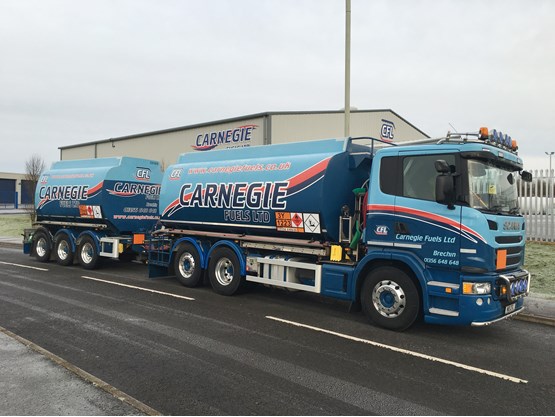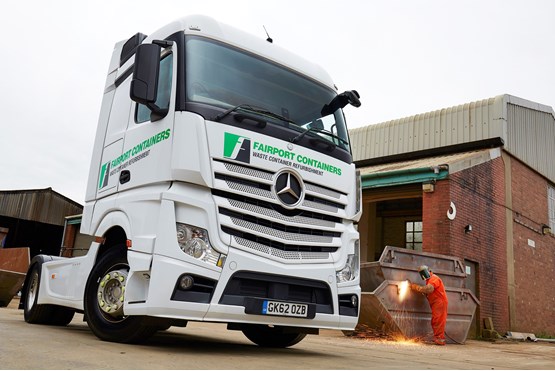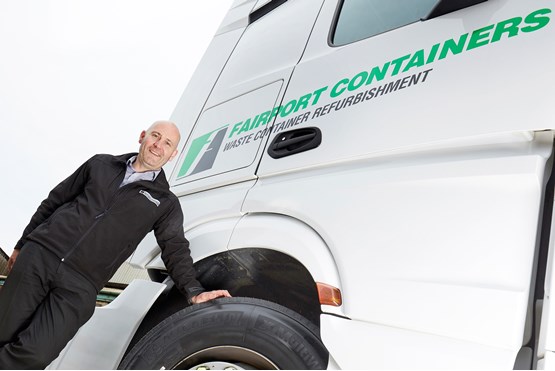Tyre giant’s business-to-business sales director Chris Smith is keen to see a level playing field with cheap imports, but explains why Michelin’s products are doing just fine without it. By John Lewis
Tyres play a crucial role when it comes to both safety and reliability. These two factors often take priority over fuel economy when it comes to tyre selection as the cost involved if something goes wrong is more damaging to the business.
Michelin believes its latest tyre, the Agilis CrossClimate, meets both requirements due, in part, to its ability to perform as well in winter snow as it does summer heat.
It ticks the safety box and also reduces downtime as vehicles will no longer have to be taken off the road to switch from winter to summer tyres and back again as the seasons change.

What’s equally important is the way the CrossClimate’s sidewall has been reinforced against damage.
“Aside from safety, what really matters to fleets is robustness and longevity,” says Michelin sales director, business-to-business Chris Smith (above).
“Those are the features that take priority ahead of fuel economy.
“Uptime is critical as far as supermarkets on home delivery work are concerned. What they don’t want is a van sitting at the roadside with a flat tyre and customers’ groceries on-board.”
Attitudes are similar among truck operators. “One of the first questions they ask us is how much mileage a tyre is likely to achieve,” he says.
Fleets in the construction and waste industries, in particular, will then start enquiring about its ability to stand up to the in-service battering it is sure to receive.
READ MORE: Fleet managers to gain better awareness of tyre performance issues with ICFM's Michelin masterclass
That is a perennial concern of Brechin, Angus-based oil distributor Carnegie Fuels. It runs 6x2 rigid tankers and last summer Michelin suggested that it trialled the X Works D drive-axle and XZY3 steer- and tag-axle tyres.
The trucks regularly have to go up rocky tracks to deliver oil to farms and houses way out in the Scottish countryside and their tyres can suffer from stone damage.
“Water gets in as a consequence and the rubber starts to peel,” says Kevin Carnegie, who runs the business.
That has not been a problem with the Michelins, he adds. “We’re getting no stone ingression and virtually no cuts. We’ve now got a set of Michelin tyres on a vehicle that have lasted longer than any other set we’ve used before.”
To date, they have covered more than 65,000 miles. “They were regrooved in January and Michelin expects us to get another 25% out of them,” says Carnegie.

He explains why he was initially reluctant to try the tyres.
“I thought they weren’t the right tyres for us because they looked too much like construction tyres; and we’re all about distribution,” he says.
“But I’ve been very impressed with them.”
So confident is it in the X Works and X Multi tyres’ durability that Michelin offers a guarantee against financial risk of damage.
It promises to refund operators for any accident damage suffered before a tyre is 50% worn, provided it has been registered on the Michelin MyAccount web portal within one month of purchase.
The refund is calculated against the remaining tread depth. The claim rate has been less than 1%, and Smith stresses that all the claims received have been paid.
“What we haven’t done is offer a guarantee with all sorts of exclusions,” he says. “There would be no point doing that.”
Despite this offer, one thing Michelin has not managed to do is wean all truck operators away from their fondness for cheap, budget tyres.

That is despite the fact that the ability of such tyres to resist damage or offer decent fuel returns in the way that premium products can is often questionable, and that, in most cases, they cannot be retreaded.
“They account for about one-third of the market and north of 90% of them come from China,” says Smith.
“Obviously the situation makes it more challenging for us to sell new product and it has had a major impact on the retread market over the past two or three years.”
Some operators are favouring cheap new tyres rather than environmentally-friendly retreads, which re-use existing casings.
Tyres which cannot be retreaded have to be scrapped prematurely, presenting disposal challenges.
So would he like to see the European Union slap tariffs on Chinese truck tyre imports? “All we want is a level playing field,” he replies diplomatically.
READ MORE: Michelin warns fleets on cost of under-inflated tyres
The Chinese onslaught has not deterred Michelin from introducing new truck products.
The X Multi range was launched last year while this year will witness the arrival of a new tyre for regional applications with the accent on fuel efficiency, Smith says.
While van operators’ priority might be safety and reliability, fuel efficiency is still important, particularly for hauliers on inter-urban trunking work.
Michelin has invested more than £10 million in a major upgrade of its Stoke-on-Trent logistics operation and has also opened a new distribution centre. It has 26 loading bays which can be used simultaneously around the clock.
It is also investing in its Stoke retread operation – despite the aforementioned pressures on that sector of the market – with a 12,000sq m warehouse being built alongside the retread plant to store casings ahead of processing.
No matter whether they deal in budget imports or operate at the premium end of the market, all truck tyre manufacturers and importers are having to adjust to changes in the size of tyre being specified.
Though still popular, the long-standing domination of 295/80 R22.5 is being steadily eroded by 315/70 R22.5 says Smith, with 315/80 R22.5 favoured in some cases.

“The change has occurred as a consequence of Euro 6, which has made trucks heavier at the front,” he says.
“The 315/70 and 315/80 sizes are better able to cope with the weight, they have a wider footprint and wear evenly and they tend to be good on fuel.”
For vans, while 16-inch sizes still rule, there is increased interest in 17 inches, he reports. That is especially the case for well-equipped, top-of-the-range models with bigger wheels fitted for cosmetic purposes.
Budget tyres dominate the van market, says Smith, accounting for two-thirds of sales.
“The remaining third is split 50/50 between premium brands and mid-range brands that fall just below them, with major fleets tending to go the premium route,” he says.

“Quite often that’s because the tyre manufacturer’s sales people have explained the advantages to them, especially where damage resistance is concerned.”
The salesforce cannot get around to everybody, however.
Budget, mid-range or premium, van tyres will last longer if properly looked after, with attention paid to pressures.
“Unfortunately, the standard of maintenance is not always as good as it is with truck fleets,” Smith says.
That is especially the case where vans are used to deliver a service rather than goods, he contends.
One business that has ditched budget truck tyres in favour of premium products is Fairport Containers.

It did so last year after a set of Michelin 315/70 R22.5 X MultiWay 3D XDE drive-axle tyres clocked up nearly three times the miles of a budget rival in a tyre trial.
They recorded 382,708km (close to 240,000 miles), travelling more than 250,000km (155,000 miles) further than the budget tyres’ approximate run-out figure of 132,000km (82,000 miles) at 3mm – the tread depth at which Fairport replaces its tyres.
Fairport service manager Lee Cunliffe (above) describes the latter as “a miserable mileage”.
He says: “Going for budget tyres makes you think you are saving money, but it was actually quite the reverse.
"They were hitting us hard in the pocket. So, after comparing the trial data, a switch to premium was a no-brainer.”


















Login to comment
Comments
No comments have been made yet.